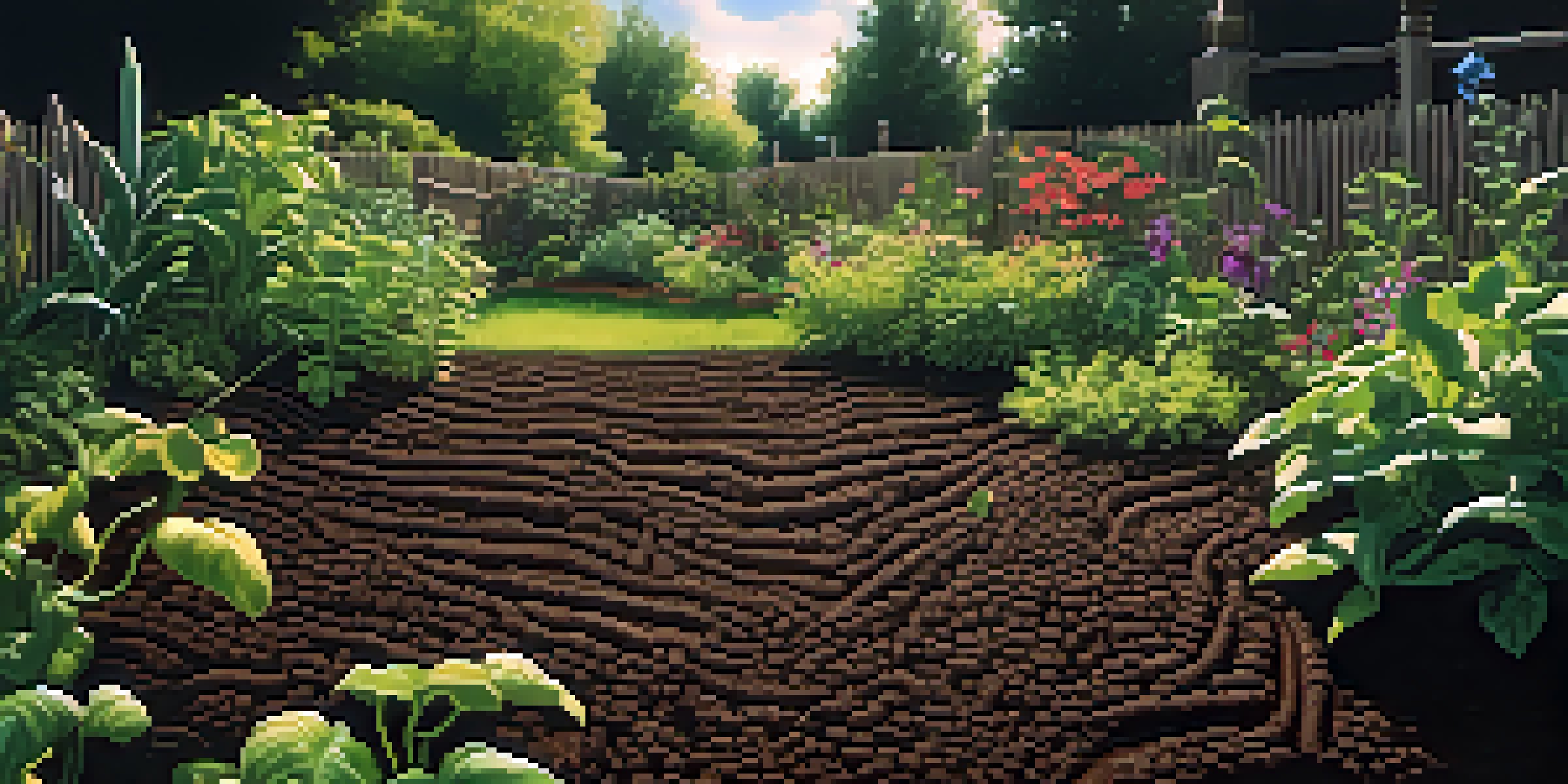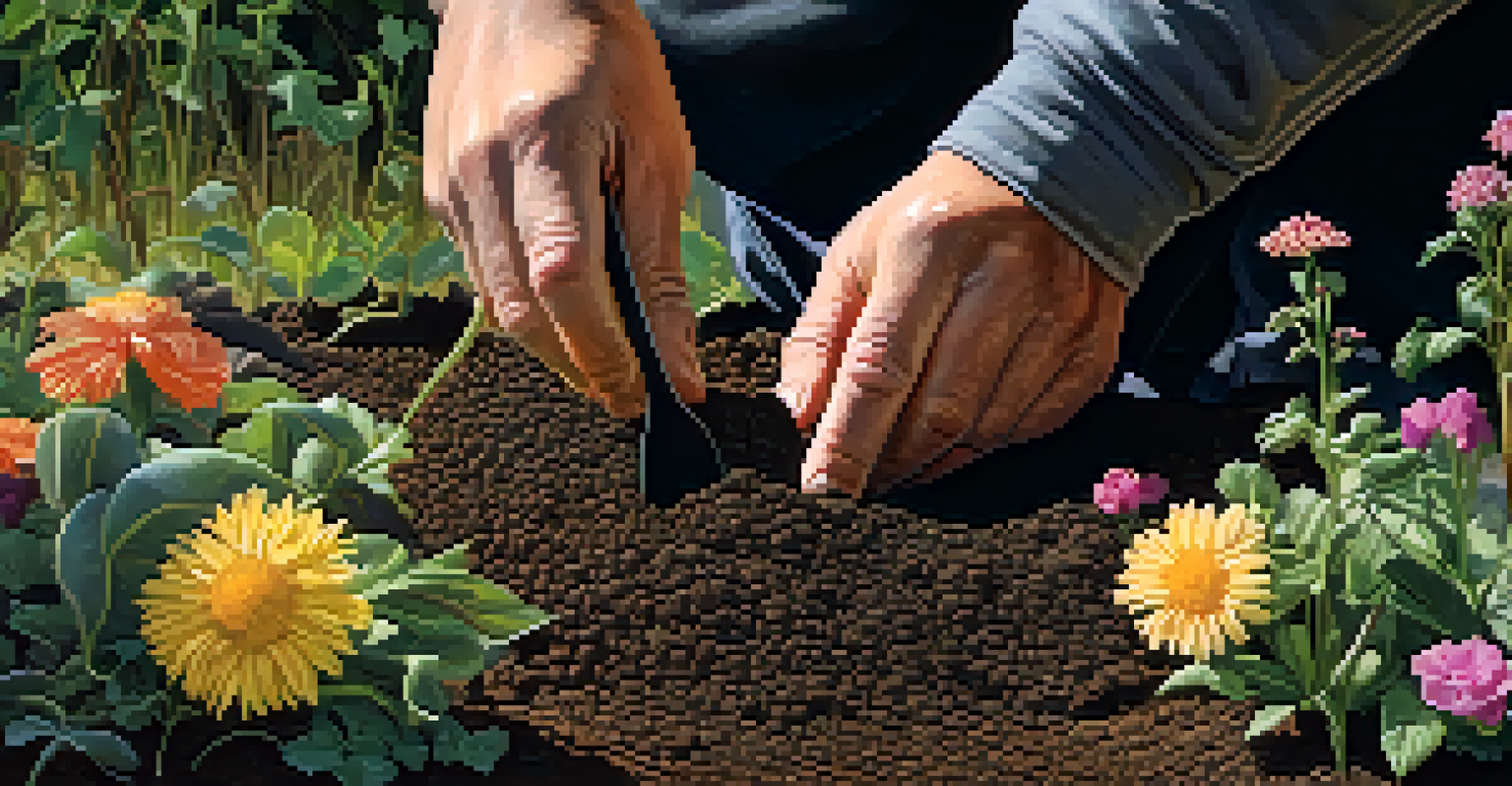The Importance of Soil Health in Climate Resilient Gardening

What is Soil Health and Why Does It Matter?
Soil health refers to the condition of soil that supports plant growth, ecosystem functions, and overall environmental quality. It's not just about nutrient levels; it encompasses the biological, chemical, and physical properties of the soil. Maintaining healthy soil is crucial for sustainable gardening, especially as climate change presents new challenges.
Healthy soil is the foundation of a healthy ecosystem.
Healthy soil acts like a sponge, retaining moisture and nutrients while facilitating drainage. This balance is vital for plants to thrive, especially during extreme weather events like droughts or heavy rains. In essence, healthy soil prepares your garden to better withstand these climate stresses.
Moreover, healthy soil contributes to carbon sequestration, helping mitigate climate change by storing carbon dioxide. By focusing on soil health, gardeners can play a role in combating climate issues while enjoying resilient gardens that flourish despite unpredictable weather.
The Role of Organic Matter in Soil Health
Organic matter, such as compost and decomposed plant material, is a key component of healthy soil. It improves soil structure, enhances water retention, and supplies essential nutrients to plants. Think of organic matter as the secret ingredient that makes your garden's soil rich and fertile.

Incorporating organic matter into your soil not only boosts its health but also enhances its ability to adapt to climate extremes. For instance, during dry spells, organic-rich soil retains moisture, reducing the need for frequent watering. Conversely, in periods of heavy rainfall, it improves drainage, preventing waterlogging.
Soil Health Supports Resilience
Maintaining healthy soil is essential for supporting plant growth and enhancing ecosystem functions, especially in the face of climate change.
Creating a healthy soil ecosystem filled with organic matter also fosters biodiversity, attracting beneficial microbes and earthworms. These organisms work tirelessly to break down nutrients and improve soil structure, ensuring your garden remains productive and resilient.
Understanding Soil pH and Its Impact
Soil pH measures the acidity or alkalinity of the soil, which significantly influences plant health and nutrient availability. Most plants thrive in a slightly acidic to neutral pH range (around 6.0 to 7.0). Understanding your soil's pH level is essential for optimal gardening, especially in the context of climate resilience.
We need to rethink how we manage the soil to ensure its health and productivity for future generations.
If your soil is too acidic or alkaline, plants may struggle to absorb nutrients, leading to poor growth. Regular soil testing can help you monitor pH levels and make necessary adjustments, such as adding lime to raise acidity or sulfur to lower it. This proactive approach keeps your plants healthy, even when facing climate-related stressors.
Moreover, different plants have varying pH preferences, so knowing your soil's pH can guide your planting choices. By selecting plants suited to your soil conditions, you not only promote a thriving garden but also enhance its resilience to climate challenges.
The Importance of Soil Microorganisms
Soil is teeming with microorganisms, including bacteria, fungi, and protozoa, which play essential roles in nutrient cycling and plant health. These tiny critters break down organic matter, making nutrients available to plants, and help form soil structure, which is vital for water retention. Think of them as the unseen heroes of your garden.
Encouraging a diverse microbial community in your soil enhances its resilience against pests and diseases. Healthy microbes can outcompete harmful pathogens, reducing the need for chemical interventions. This natural balance allows your garden to thrive even in challenging environmental conditions.
Organic Matter Boosts Soil Quality
Incorporating organic matter into soil improves its structure, water retention, and nutrient availability, leading to more resilient gardens.
To foster these beneficial microorganisms, practice minimal tillage, avoid chemical fertilizers, and incorporate organic matter. By nurturing your soil's microbial life, you're not just enhancing soil health; you're also creating a more sustainable and resilient garden ecosystem.
Building Soil Structure for Resilience
Soil structure refers to how soil particles bind together, affecting air circulation, water movement, and root growth. Healthy soil structure is crucial for a resilient garden, as it influences how well your plants can access nutrients and withstand environmental stressors. Think of it as the foundation of a sturdy house—without it, everything else can crumble.
Improving soil structure can be achieved through practices like adding organic matter, practicing crop rotation, and avoiding compaction. These methods create a well-aerated, loosely packed soil that allows roots to grow deep and access water during dry periods. In turn, this gives plants a better chance of thriving amid fluctuating weather patterns.
Additionally, good soil structure enhances drainage, reducing the risk of waterlogging during heavy rains. By focusing on building robust soil structure, you're equipping your garden to handle the ups and downs of climate change, ensuring it remains productive and vibrant.
Water Management Strategies for Healthy Soil
Effective water management is vital for maintaining soil health, especially with the growing concerns around climate variability. Strategies like mulching, drip irrigation, and rainwater harvesting can significantly improve soil moisture retention while minimizing water waste. Think of these techniques as a way to ensure your garden stays hydrated without over-relying on external water sources.
Mulching, for instance, not only conserves moisture but also suppresses weeds, which can compete with your plants for resources. By creating a protective layer, you’re helping your soil stay cool and moist, making it more resilient to heat waves. This simple practice can lead to healthier plants with less stress.
Diverse Crops Enhance Soil Health
Planting a variety of crops promotes soil health and resilience by improving nutrient cycling and reducing pest outbreaks.
Implementing efficient irrigation systems, like drip irrigation, ensures that water goes directly to the plant roots, reducing evaporation and runoff. These water management strategies not only support soil health but also contribute to a more sustainable gardening practice, especially in the face of climate change.
The Benefits of Crop Diversity for Soil Health
Planting a variety of crops, also known as crop diversity, can significantly enhance soil health and resilience. Different plants have unique root structures and nutrient needs, which can improve soil structure and fertility. Just like a well-balanced diet is essential for human health, a diverse garden contributes to a thriving ecosystem below ground.
Crop diversity helps reduce pest outbreaks and diseases, as many pests are attracted to specific plants. By rotating crops and planting companion species, you can naturally deter harmful insects and promote a balanced ecosystem. This not only protects your plants but also supports healthier soil by minimizing chemical interventions.

Moreover, diverse plantings can improve soil microbial diversity, enhancing nutrient cycling and overall soil health. By fostering a varied garden, you’re not just creating a beautiful space; you’re also building a more resilient environment that can withstand climate challenges now and in the future.